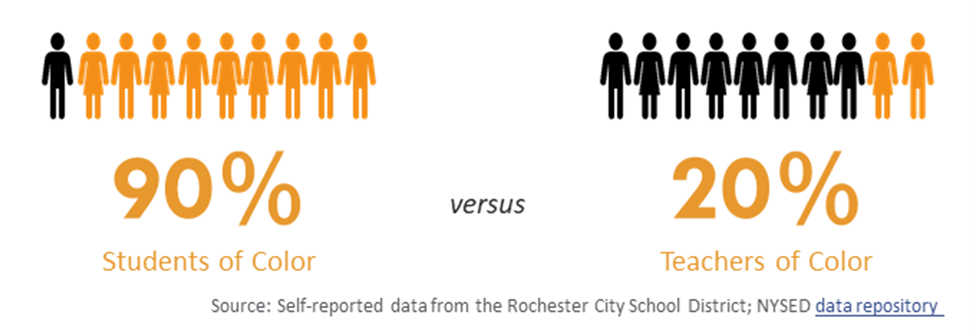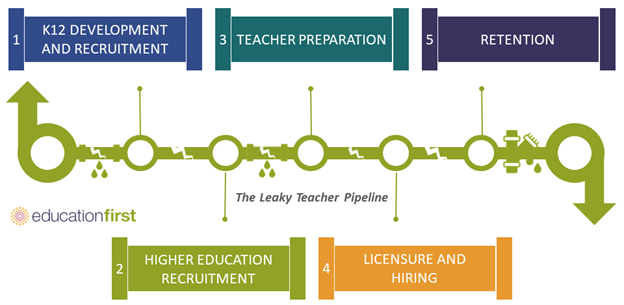
Rachel Tillman
“Now would be the time, especially with everything going on in this country, to recruit Black teachers into teacher preparation programs.”—Rachel Tillman
Up until 5th grade, Rachel Tillman had never been taught by a Black teacher. Rachel teaches 8th Grade English Language Arts at Rochester Academy Charter School. To say that experience influenced her is only part of the story. As Rachel put it, “I didn’t know there could be Black teachers until I moved back to Rochester. It was great to see someone who looked like me in that role. All I saw before that was cafeteria staff, custodians and maybe secretaries. Never a teacher.”
What Rachel describes is the “role model effect” where professionals of color have a positive influence on the aspiration of students of color. A growing body of research also demonstrates that students of color who have an educator of color at least once have an increased likelihood for academic success. This is what inspired Rachel to become a teacher in Rochester.
“I personally was inspired by a 5th grade teacher—the first African-American teacher that I had. She understood me and I understood her. She worked overtime to help us. She took us home if we missed the bus. Our relationship grew into a friendship as I grew into an adult. I call her my aunt. I wanted to have that relationship with my students because it was beautiful.”
As inspiring as Rachel’s story is, unfortunately, too few Black and Brown students are taught by a teacher who looks like them. In Rochester, students of color represent nearly 90 percent of the student population. Diversity among the teaching force, however, has not kept up. Rochester’s teachers of color comprise just 20 percent of the teacher workforce.

This disparity should implore all local education leaders to understand the root causes of this reality and determine what actions should be taken to address this opportunity gap. To further this conversation in Rochester, we are proud to release Diverse Perspectives: Findings and Strategies to Improve Teacher Diversity in Rochester, NY. This report reflects the experiences and suggestions of teachers, teacher candidates and parents of children of color on the early stages of the teaching profession—in their own words. The report summarizes key insights and findings from our conversations with stakeholders and concludes with their suggestions to improve the pipeline. Some findings include:
The teachers, teacher candidates and parents we spoke with had just as many suggestions to improve the pipeline. Rachel wants education leaders to “let it be known you’re looking for teachers of color. I believe that will help people who think they’re not going to be picked because they are people of color.” Their suggestions include:

Diversifying the teacher pipeline can be difficult work. But there is no need to go at it alone. It will require all hands on deck as there are multiple points along the leaky teacher pipeline where people fall through the cracks. We hope this report can provide a helpful first step in Rochester and other similar communities by sharing the perspectives of teachers and teacher candidates of color as well as parents of children of color. We at Education First look forward to growing our Citywide Teacher Pipeline partnership and supporting stakeholders with the necessary work to ensure that all children in Rochester can look at a teacher and see themselves. Learn more about our educator diversity work here.
| About the Rochester Citywide Teacher Pipeline Strategy Max and Marian Farash Charitable Foundation partnered with Education First to conduct an analysis of Rochester’s teacher pipeline. We collected and analyzed teacher data from K12 and higher education institutions across the region as well as conducted desk research and dozens of stakeholder interviews. We presented findings and recommendations to Farash board members, local funders, leaders of TPPs, RCSD and charter schools who identified two priority areas: 1) formalizing and strengthening teacher preparation partnerships between K12 school systems and IHEs, and 2) improving the diversity of the teacher workforce in Rochester. We then facilitated a cross-sector group of stakeholders to design a Rochester Citywide Teacher Pipeline strategy that focuses on teacher recruitment, clinical experience, new teacher excellence and teacher diversity. Education First also helped launch and facilitate work groups as well as an Advisory Group that provides guidance on the overall pipeline strategy, monitors progress and advises on policy change. |

